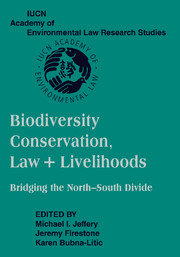 Biodiversity Conservation, Law and Livelihoods: Bridging the North-South Divide
Biodiversity Conservation, Law and Livelihoods: Bridging the North-South Divide Published online by Cambridge University Press: 31 July 2009
INTRODUCTION
Like the miner's canary, the Indian marks the shift from fresh air to poison gas in our political atmosphere, and our treatment of Indians, even more than our treatment of other minorities, reflects the rise and fall of our democratic faith.
So stated Felix Cohen in his seminal article, The Erosion of Indian Rights (1953). It is through Cohen's lens that we examine the domestic and international controversy over the resumption of whaling by the Makah Indian Nation following the recovery of the eastern North Pacific stock of gray whales (Eschrichtius robustus or “California gray whale”). The controversy raises issues of considerable significance: treaty obligations, subsistence and cultural rights versus majoritarianism, contested conservation assessments, animal rights, and politics within multilateral environmental institutions.
We explore these issues independently of our personal views about whaling. Although we support the Makah Tribe's right to decide for itself whether to engage in subsistence whaling, we reject the label “pro-whaling.” We likewise do not reflexively label all of those who come to a different conclusion than we do with the pejorative label “anti-indigenous” or “anti-Indian.” We fully recognize that principled people may weigh the interests at hand and come to different conclusions. The aim of this article is thus broader than the Makah and whales.
To save this book to your Kindle, first ensure [email protected] is added to your Approved Personal Document E-mail List under your Personal Document Settings on the Manage Your Content and Devices page of your Amazon account. Then enter the ‘name’ part of your Kindle email address below. Find out more about saving to your Kindle.
Note you can select to save to either the @free.kindle.com or @kindle.com variations. ‘@free.kindle.com’ emails are free but can only be saved to your device when it is connected to wi-fi. ‘@kindle.com’ emails can be delivered even when you are not connected to wi-fi, but note that service fees apply.
Find out more about the Kindle Personal Document Service.
To save content items to your account, please confirm that you agree to abide by our usage policies. If this is the first time you use this feature, you will be asked to authorise Cambridge Core to connect with your account. Find out more about saving content to Dropbox.
To save content items to your account, please confirm that you agree to abide by our usage policies. If this is the first time you use this feature, you will be asked to authorise Cambridge Core to connect with your account. Find out more about saving content to Google Drive.